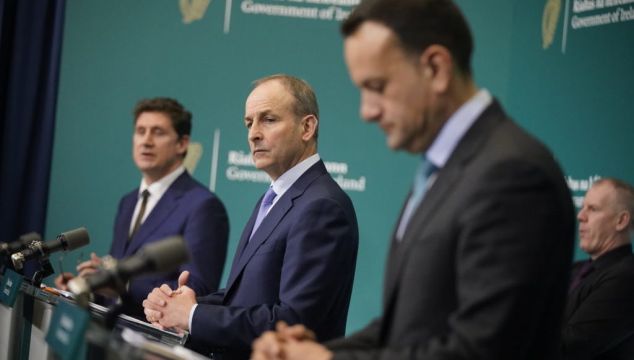Updated: 8.45am. Additional reporting by Vivienne Clarke
The State will turn the heating down in public buildings and ask public sector office employees to work on the same floor under energy-saving measures set to be approved by the Cabinet on Wednesday, Minister for the Environment Eamon Ryan has said.
The meeting comes as concerns grow over both energy supplies and costs this winter, with further price increases predicted before the end of the year.
Under the plans, public buildings - with the exception of social institutions such as hospitals - are to be heated to a maximum of 19 degrees with the unnecessary heating of low occupancy spaces also targeted, Mr Ryan said following a meeting of senior Government ministers.
Germany introduced similar measures last week.
"It is critical that we reduce our use to help save money. It's very practical and we will lead off in the public sector. Not that we go short, but be careful how we heat our spaces," Ryan told RTÉ on Tuesday.
Energy costs have surged since Russia's invasion of Ukraine in February, in part due to Russia's retaliation for a raft of Western sanctions.
Mr Ryan said the measures, including encouraging consumers to avoid washing their clothes or dishes between 5pm-7pm, the most expensive peak time of the day, were aimed at preserving particularly tight supply in the State as well as cutting bills.
The Government also intends to provide financial support to consumers and businesses in the budget due to be unveiled on September 27th.
Mr Ryan said he would also support proposals from the European Commission at a meeting of EU energy ministers on Friday to put a price cap for certain power generators that do not run on gas and use some of the excess revenue to reduce people's bills.
"I believe we'll be able to get agreement," Mr Ryan said.
The plan proposes a number of energy-saving measures, such as turning down the heating in public buildings and offices.
Price increases
Meanwhile, Dr Paul Deane, a senior researcher in clean energy futures with Science Foundation Ireland's MaREI Centre in University College Cork, has warned that the energy crisis will deepen and there will be another series of price increases before Christmas.
Ireland was one of the most fossil fuel reliant countries in Europe, he told RTÉ Radio’s Morning Ireland, adding that there is a need to reduce this reliance as much as possible.
Householders should be given information on how to dissect energy loads, he urged. People could still go about their daily lives but they would know when the best times were to use the dishwasher, the tumble dryer or when it would be best to defer use of the electric shower, he explained.
"This is not about stopping everybody using energy, it is about smarter use at different times."
While some might consider such a suggestion as insignificant or as tokenism, he said, if one million households did this it would make a difference. Large industry, manufacturing could also change their use loads, he added.
A coordinated campaign of social solidarity on the smart use of energy would go a long way towards getting out of the crisis, Dr Deane said, adding the situation was very serious.
He warned "the crisis will deepen" and not everybody can be shielded, however the most vulnerable must be protected, he said.
-Reuters







